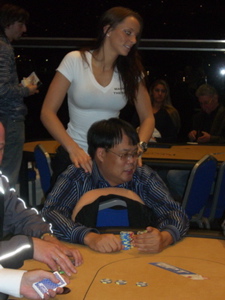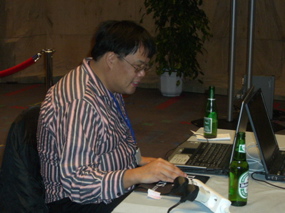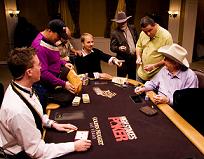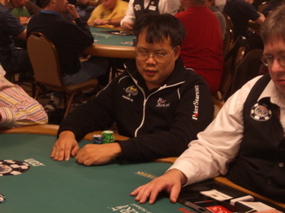 Whilst the modern age is jam-packed with young aggressive players who play on 'feel', it is also brimming with the likes of Ferguson, Binger and Mattros, all of whom have followed in the foreboding footsteps of Sklansky by adopting a more mathematical approach to the game. One of poker's most recent additions to that list is William Chen, a quantative analysist and software designer more than worthy of that 'poker geek' label.
Whilst the modern age is jam-packed with young aggressive players who play on 'feel', it is also brimming with the likes of Ferguson, Binger and Mattros, all of whom have followed in the foreboding footsteps of Sklansky by adopting a more mathematical approach to the game. One of poker's most recent additions to that list is William Chen, a quantative analysist and software designer more than worthy of that 'poker geek' label.With his cheery go lucky attitude, 'Bill', as he is more often referred, shook the foundations of the 2006 World Series by taking home two bracelets for a near $800k in prize winnings. A year later, he returned to the Rio to add another four in-the-money performances to his record, producing a total of twelve WSOP cashes in just three years.
Now one of 23 Team PokerStars sponsored players, Bill prised himself away from his day job to set his sights on Bahamian booty at this year’s Caribbean Poker Tour. Sensing that Bill was away from the felt, I blocked his route to the beach and shoved him into the interview room for a few moments under the Beagle spotlight.
Snoopy: Tell us about your background. How did you first get into poker and what do you like to do in your free time?
Bill Chen: I picked up the game whilst I was at college to use for beer money and groceries. Berkley is one of the most expensive places in the country, so I needed an additional income. If I hadn’t have played poker, then I probably would have been forced to find a roommate.
In my free time, I like to partake in a spot of yoga. It helps with my poker and also losing weight, which I’m not doing particularly successfully. I have lost 25 pounds though.
Snoopy: How important is poker to you? Are you an obsessive person who plays online 24/7 and can’t stop thinking about the game?
BC: I’m frequently thinking about poker and I play a lot of poker online. Even when I’m working, I’m thinking about poker theories. I dream about poker now and then, but it’s normally one of those dreams where the cards change into something more favourable.
Snoopy: You started life as a cash game player. Why did you move onto tournaments? Which do you consider to be your strongest?
BC: I play a lot of cash still, but tournaments are so much fun, so I decided to try them out by starting at small $100 events. Also, I found that my opponents make more mistakes in tournament poker and that I could use mathematics to my advantage. This is still the case even today, but it very much depends on the limits you play.
In tournaments, you tend to get more weak players, perhaps those who have either qualified via satellites or are just rich and love to play. You don’t really get these types of players in cash games, which makes the table a bit more solid.
To be honest, I just find tournaments more of a challenge. You always have to be adapting your game to different situations and you end up playing against a range of opponents instead of the same, familiar group of players.
Snoopy: What was your motivation behind writing your book ‘Mathematics In Poker’? What other books would you recommend to players?
BC: I was part of this group called Barge and Chuck, when I was presented this idea of writing an advanced book on poker, a poker text book of sorts with a mathematical slant. I knew there would be a niche market, but I was delighted that it sold 25,000.
There are a few books I’d recommend. I’m a big fan of the Sklansky series and I’ve read Mike Caro’s Book of Tells, but Winning Low-Limit Hold’Em is a really good book.
 Snoopy: You mentioned Caro there, but as someone with such a big mathematical background, how important are feel and physical reads to your game?
Snoopy: You mentioned Caro there, but as someone with such a big mathematical background, how important are feel and physical reads to your game? BC: I put an emphasis on mathematics because it’s what I’m good out, but I don’t discount feel and physical tells either. However, I rarely get a dead on tell. I’ve folded Kings just twice in my life, and both times they had Aces, but it’s a rare occurrence.
Snoopy: Are you a believer in poker instinct? Can instinct ever override logic?
BC: I think people hold too much trust in their reads. When most people make physical reads, they’re not usually certain enough. I remember Phil Hellmuth being sure that I had a specific hand, when in fact he was totally wrong, so nobody’s reads are perfect. I think Negreanu’s the best reader of players, he has a great level of confidence in his reads.
Personally though, I’m more of the Chris Ferguson and Andy Bloch ilk, both of whom are great mathematical players.
Snoopy: Have you ever been a gambler? Do you ever play just for the thrill rather than the challenge?
BC: Yes, I like to gamble and have fun. I was at a restaurant the other day playing credit card roulette to see who paid the bill.
Snoopy: In your coinflip theory, you mention that players lose their edge when they steam. Do you ever go on tilt? What is your advice for resisting tilt?
BC: If you’re a good player and you’re losing, it’s often because you’ve started making poor decision due to being in a different emotional mood. Players should be making decisions independent of their mood, and I think this is something that I’m very good at as a level-headed player. I find it very easy to stop if I’m playing badly, mainly because I am able to keep speaking to myself and assessing when I’m playing irrationally.
Snoopy: You seem to be a dab hand at a range of games. Which do you consider to be your strongest and why? Which is your favourite?
BC: My best game is Limit. There are more decisions in Limit, whilst No Limit is hard to quantify. It’s much more psychological and emotions tend to rise to the surface more often. Limit, however, can be a very mechanical game, so I’d say that I probably have more fun playing No Limit.
My favourite game is HORSE because you get to play five different games.
Snoopy: You made a brief appearance on High Stakes Poker. What players in that show would you like to play and which would you prefer to avoid?
 BC: When I played on High Stakes Poker, I had Daniel Negreanu to my left, and Doyle on my right. In fact, Doyle is one of those players who has an awesome combination of mathematics and intuition, which is incredible. What is he, like 80 or something? These are the players I want to avoid.
BC: When I played on High Stakes Poker, I had Daniel Negreanu to my left, and Doyle on my right. In fact, Doyle is one of those players who has an awesome combination of mathematics and intuition, which is incredible. What is he, like 80 or something? These are the players I want to avoid.There are a few players who maybe don’t have the experience but are taking a shot, these are the guys I want to play. Jamie Gold, for example, although he isn’t as bad as everyone says, he’d come straight from winning the World Series to playing this game, so became a target. He did his best though.
Snoopy: If you could steal the skill of one player, what would that skill be and which player would you choose?
BC: Daniel’s talking ability. He has a non-threatening and friendly way of prising information out of people. He has a natural ability for it, but I always believe it can be developed.
Snoopy: You come across as a fun-loving kind of guy, but did your sudden rise to fame within the industry have any negative effects?
BC: I can’t complain about too much, but sometimes when you’re in the middle of a tournament and people try to ask you advice about hands or tell you a bad beat it’s a bit tricky. As a PokerStars pro I have to be amicable and listen, but if I’m on a break, I really want to have that break. These discussions can be interesting, just not during the break.
Snoopy: What was more important to you – the money or the bracelets?
BC: I never really think about either when I’m playing, I just focus on the hands I’m playing and winning the comp. Prior to the tournament, I’d go for the money – I’m poor! No, take that back.
Snoopy: What did you do with your WSOP winnings? What is your biggest extravagance?
BC: I’m not really a big spender. I love to spend money on having fun, going to clubs and eating in restaurants. I also understand the importance of making investments.
 Snoopy: If there were one thing in poker that you could change, what would it be?
Snoopy: If there were one thing in poker that you could change, what would it be?BS: Can I say the US regulations on online poker? Yeah, I’d change them. I considered moving to England once, but I have family here.
An individual's behaviour at the table can annoy me. I hate it when players make derogatory comments about people’s play. I don’t mind people celebrating hands, but preferably after the tournament. Most of these players are aware of their actions, but just don’t have any self-control. Phil, for example, is a nice player away from the table, but I don’t like what he says to opponents whilst playing. Even if it’s strategic, it’s still wrong.
Snoopy: What is the most embarrassing thing that has happened to you in poker?
BC: My friends could certainly tell you a few stories. It’s embarrassing when I’m playing and then suddenly realise that I’ve lost my wallet. Actually, that topless photo of me from Monte Carlo was pretty embarrassing. I know the guy that took it too.
Snoopy: Where did you learn your dance moves?
BC: Ha, I should take some lessons. There was a big hippy movement in Berkley and plenty of mosh pits. I just like to have a good time.
Snoopy: Would you ever consider dying your hair blonde?
BC: If you paid me enough! I’ll do it for 100k.